 W
WTouch! Generations is a Nintendo brand used for the Nintendo DS and Wii showing games created to appeal to a broader audience than the traditional gamer. Nintendo retired the brand with the launch of the Nintendo 3DS in 2011, 6 years after its introduction. Regardless of this, some titles that were introduced under the brand continue to receive follow-up entries on the contemporary and future Nintendo consoles.
 W
W100 Classic Book Collection, known in North America as 100 Classic Books, is an e-book collection developed by Genius Sonority and published by Nintendo, which was released for the Nintendo DS handheld video game console. First released in Europe in December 2008, it was later released in Australia in January 2009, and in North America in June 2010. The game includes one hundred public domain works of literature.
 W
WAnother Code: R – A Journey into Lost Memories is a point-and-click adventure game for the Wii console. It is the sequel to Another Code: Two Memories. Unlike its predecessor, the game has not been released outside Japan and Europe.
 W
WArt Academy, also known as Art Academy: Learn painting and drawing techniques with step-by-step training in the PAL regions and Artistic Taste Classroom DS in Japan, is an art training software for the Nintendo DS handheld game console. It was developed by Headstrong Games, and published by Nintendo. Art Academy was originally a two-part training application only available for download via the DSiWare service since 2009. It was later re-released in 2010 as a fully compiled, retail-able DS Game Card with added features, thus also making it available for original Nintendo DS and Nintendo DS Lite users.
 W
WBig Brain Academy is a puzzle video game published and developed by Nintendo for the Nintendo DS handheld video game console. It was released in Japan on June 30, 2005, and subsequently in other regions in summer 2006. The game was planned to be released in China for the iQue DS system and appeared in the system's trailer, but this release was cancelled for unknown reasons. It has been compared to Brain Age: Train Your Brain in Minutes a Day!. It was marketed under Nintendo's Touch! Generations brand. A sequel, Big Brain Academy: Wii Degree, was released on the Wii in April 2007.
 W
WBig Brain Academy: Wii Degree, known in the PAL region as Big Brain Academy for Wii and in Japan as Wii de Yawaraka Atama Juku (Wiiでやわらかあたま塾), is a video game released for the Wii. A sequel to the game Big Brain Academy for the Nintendo DS, it too measures a player's brain's weight, but with new games and puzzles to solve. The game makes use of Miis and uses WiiConnect24 features, allowing competition amongst users' friends, whose codes are automatically imported from the Wii's internal address book.
 W
WBrain Age: Train Your Brain in Minutes a Day!, known as Dr. Kawashima's Brain Training: How Old Is Your Brain? in PAL regions, is an edutainment puzzle video game. It was developed and published by Nintendo for the Nintendo DS. Nintendo has stated that it is an entertainment product inspired by Tohoku University professor Ryuta Kawashima's work in the neurosciences.
 W
WBrain Age 2: More Training in Minutes a Day!, known as More Brain Training from Dr Kawashima: How Old Is Your Brain? in PAL regions, is an edutainment puzzle game and the sequel to Brain Age: Train Your Brain in Minutes a Day! (2005). It was developed and published by Nintendo for the Nintendo DS handheld game console. Before the game begins, the player must perform a Brain Age Check to determine their brain age, which ranges from 20 to 80, to determine approximately their brain's responsiveness. A brain age of 20, the lowest age that the player can achieve, indicates that the player's brain is as responsive as that of an average 20-year-old. After the player is told their initial brain age, they can complete a series of minigames to help improve their brain's responsiveness, after which they can run Brain Age Check again to determine their updated brain age.
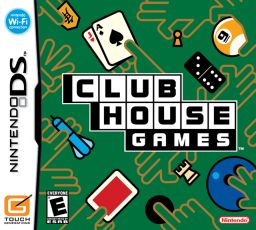 W
WClubhouse Games, known in some European countries as 42 All-Time Classics and in Japanese as Daredemo Asobi Taizen, is a compilation video game developed by Agenda and published by Nintendo for the Nintendo DS, consisting of board, card, and tabletop games from around the world. It was released in Japan on November 3, 2005, in Europe on September 29, 2006, in North America on October 9, 2006, and in Australia on October 26, 2006.
 W
WCrosswords DS and as Nintendo presents: Crossword Collection in PAL regions is a puzzle video game developed by American studio Nuevo Retro games released by Nintendo for the Nintendo DS handheld video game console. It was previously released in Australia as CrossworDS but a new OFLC entry confirms that Nintendo Australia is re-releasing it with a European localization. It was first released in North America, and has since been released in Australia. Crosswords DS features over 1,000 crossword puzzles that the player solves by using the stylus. Despite the title, it also features word search puzzles and anagram puzzles. It makes use of similar handwriting mechanics that the Brain Age titles make use of. Crosswords DS is included in the Touch! Generations series of titles, which includes such popular games as Brain Age: Train Your Brain in Minutes a Day! and Nintendogs. The background music was composed by Fabian Del Priore.
 W
WElectroplankton is an interactive music video game developed by indieszero and published by Nintendo for the Nintendo DS handheld video game console. It was first released in Japan in 2005, and was later released in North America and Europe in 2006. This game allows the player to interact with animated plankton and create music through one of ten different plankton themed interfaces. The first edition of Electroplankton in Japan is bundled with a set of blue colored ear bud headphones.
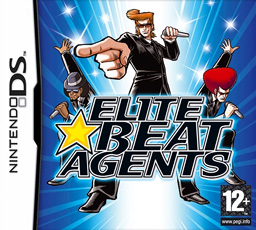 W
WElite Beat Agents is a music video game developed by iNiS and published by Nintendo for the Nintendo DS handheld game console. It was released in North America, Europe and South Korea. As the second of three rhythm games developed by iNiS specifically for the DS, it is the spiritual sequel and international counterpart to Osu! Tatakae! Ouendan, a Japanese rhythm game released in 2005, sharing many common elements with it. Similar to Ouendan, the player taps and drags on indicated locations on the touch screen of the DS in time to the rhythm of the music to score points, while the upper screen shows comic-style scenes of the fictional "Elite Beat Agents" cheering on others in tough situations through their dance moves. The improvements made in this game were implemented in the Japanese game's sequel, Moero! Nekketsu Rhythm Damashii Osu! Tatakae! Ouendan 2.
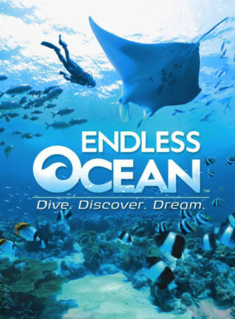 W
WEndless Ocean is a scuba diving adventure game for the Wii. It is published by Nintendo and was developed by Arika, who also worked on their spiritual predecessor Everblue, another scuba diving adventure game. It was released in Japan on August 2, 2007, in Europe on November 9, 2007, and in North America on January 21, 2008 – after it had been planned for an October 2007 release.
 W
WEndless Ocean 2: Adventures of the Deep, also known in North America as Endless Ocean: Blue World and Japan as Forever Blue: Call of the Ocean , is a scuba diving video game for Wii and the sequel to Endless Ocean, previously released for Wii in 2007. It was first revealed at a Nintendo conference held on October 2, 2008. The game was released as part of the Touch! Generations series of games in the United Kingdom and Europe.
 W
WFlash Focus: Vision Training in Minutes a Day is a Touch! Generations puzzle video game developed by Namco Bandai and Nintendo SPD and published by Nintendo for the Nintendo DS handheld video game console. It was released in Japan on May 31, 2007 as Miru Chikara wo Jissen de Kitaeru: DS Medikara Training and released in North America on October 15.
 W
WHotel Dusk: Room 215 is a point-and-click adventure game for the Nintendo DS. Originally titled as Wish Room, the game made its first public appearance on May 9, 2006, at that year's E3 convention. It was originally released in North America on January 22, 2007, before being released subsequently in other regions. The game supports the Nintendo DS Rumble Pak accessory. The game was later republished in 2008 as part of the Touch! Generations line of DS games. The game was developed by the now-defunct Cing. A sequel, Last Window: The Secret of Cape West, was released in 2010 for the DS.
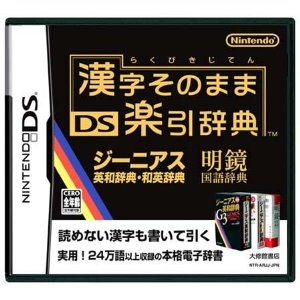 W
WKanji Sonomama Rakubiki Jiten DS , is a Kanji-English-Japanese dictionary based training software developed for the Nintendo DS and released on April 13, 2006. The software was developed by Nintendo's Software Development and Design division with assistance from Intelligent Systems. It was only released in Japan. The software is marketed as a part of the Genius series.
 W
WKotoba no Puzzle: Mojipittan is a series of Japanese word puzzle video games developed and published by Bandai Namco Entertainment, formerly Namco. The series began in arcades with Kotoba no Puzzle: Mojipittan in 2001, and has seen multiple sequels for several platforms, including the Game Boy Advance, PlayStation Portable and Nintendo DS. Gameplay is similar to Scrabble — players are tasked with using Hiragana to form words on a board by placing down pieces marked with Hiragana characters.
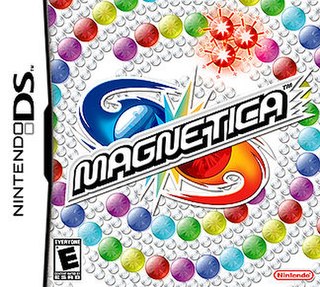 W
WMagnetica is a puzzle video game for the Nintendo DS, released as part of the Touch! Generations series. The game was developed by Mitchell Corporation and published by Nintendo, and is based on Mitchell's 1998 arcade game Puzz Loop.
 W
WMake 10: A Journey of Numbers is a puzzle/logic-style adventure game published by Nintendo for the Nintendo DS platform. It is part of the Touch! Generations brand.
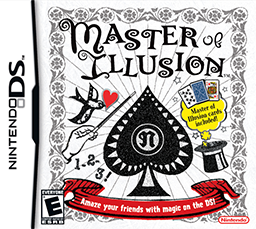 W
WMaster of Illusion, known in Europe as Magic Made Fun: Perform Tricks That Will Amaze Your Friends! and in Japan as Magic Encyclopedia , is a magician video game for the Nintendo DS. It was developed by Tenyo and Eighting and published by Nintendo, released in Japan on November 16, 2006, November 26, 2007 in North America and March 14, 2008 in Europe. Around 9 of its magic tricks were released as separate pieces of DSiWare.
 W
WMystery Case Files: MillionHeir is a puzzle adventure video game developed by Big Fish Games and Griptonite Games and published by Nintendo, for the Nintendo DS. It was released in North America and Australia in 2008, and Europe in 2009. It is the second Mystery Case Files game to be made for a portable device.
 W
WNintendogs is a real-time pet simulation video game developed and published by Nintendo for the Nintendo DS handheld video game console. It was released in Japan, and was later released in North America, Australia, New Zealand, Europe, and other regions. It was originally released in three different versions: Dachshund & Friends, Lab & Friends, and Chihuahua & Friends. It has been re-released twice, first as a bundled release with a special edition Nintendo DS with a new version called Nintendogs: Best Friends, and later as Nintendogs: Dalmatian & Friends.
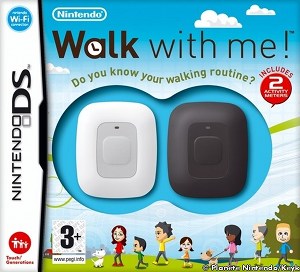 W
WPersonal Trainer: Walking is a 2008 exergaming application developed by Nintendo Network Service Development and Creatures Inc. for the Nintendo DS. The pedometer accessory was developed in-house at Nintendo NSD, while the software portion was developed in conjunction with Nintendo NSD, Creatures Inc., and Engines.
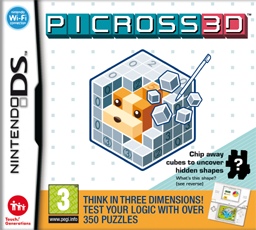 W
WPicross 3D, known in Japan as Rittai Picross , is a puzzle video game developed by HAL Laboratory and published by Nintendo for the Nintendo DS. It was released in Japan in March 2009, in Europe in March 2010, and in North America in May 2010. It uses similar nonogram mechanics to Picross DS, but it puts it in 3D. Outside Japan, the game is part of Nintendo's Touch! Generations brand. A sequel, Picross 3D: Round 2, was released for the Nintendo 3DS in Japan in October 2015, in North America in September 2016, and in Europe and Australia in December 2016.
 W
WPicross DS (ピクロスDS) is a puzzle video game developed by Jupiter and published by Nintendo for the Nintendo DS handheld video game console. It is the second Picross game to be released by Nintendo in Europe and North America after Mario's Picross suffered a commercial failure in regions outside Japan, where many Picross games have been released for several Nintendo consoles. Like other Picross games, it presents the player with a series of nonogram logic puzzles to solve. It was first released in Japan, and was later released in North America, Europe and Australia.
 W
WPlanet Puzzle League, known as Puzzle League DS in Europe, and as Panel de Pon DS in Japan, is a video game for the Nintendo DS handheld video game console in the Puzzle League/Panel de Pon visual matching puzzle game series. In North America, Planet Puzzle League is part of the Touch! Generations brand; in Japan, Panel de Pon DS is marketed in the general Touch! brand. The publisher for the game is Nintendo, and the developer is Nintendo second-party developer Intelligent Systems, creator of the original Panel de Pon and its cult classic English-language adaptation Tetris Attack. The game was released in Japan on April 26, 2007 in North America on June 4, 2007, and in Europe on June 29, 2007.
 W
WProfessor Kageyama's Maths Training: The Hundred Cell Calculation Method is a puzzle video game published by Nintendo and developed by Jupiter for the Nintendo DS handheld video game console. It was first released in Japan, then later in Europe and Australasia. It was released in North America as Personal Trainer: Math on January 12, 2009 and also in South Korea in 2009. The game is part of both the Touch! Generations and Personal Trainer series. The game received mixed reviews, with common criticisms cited for the game's difficulty in recognizing some numbers and for not being very entertaining to play. At GameRankings, it holds an average review score of 65%.
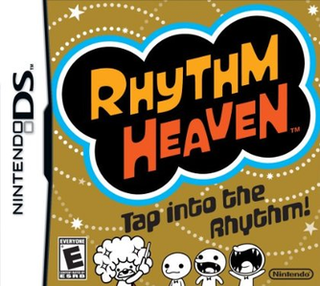 W
WRhythm Heaven, known as Rhythm Paradise in Europe and Rhythm World in Korea, is a Japanese rhythm video game developed by Nintendo SPD for the Nintendo DS. It is the second game in Nintendo's Rhythm Heaven series and the first one released worldwide, following the Japan-only Game Boy Advance title Rhythm Tengoku, and was succeeded by Rhythm Heaven Fever for the Wii and Rhythm Heaven Megamix for the Nintendo 3DS. The game was released in Japan on July 31, 2008, in North America on April 5, 2009, in Europe on May 1, 2009, and in Australia on June 4, 2009.
 W
WShaberu! DS Oryōri Navi is a cooking simulator for the Nintendo DS. It was released on July 20, 2006 in Japan.
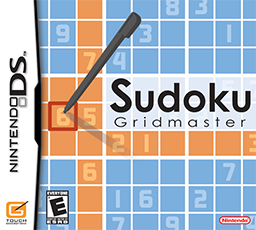 W
WSudoku Gridmaster is a Touch Generations puzzle video game for the Nintendo DS, released on March 23, 2006 in Japan, June 26, 2006 in the United States and October 27, 2006 in Europe. It was developed and published by Hudson Soft in Japan, and published by Nintendo in the rest of the world.
 W
WTetris DS is a puzzle video game developed and published by Nintendo. It was released for the Nintendo DS on March 20, 2006, in North America, April 13, 2006, in Australia, April 21, 2006, in Europe, and April 27, 2006, in Japan. An installment of the Tetris franchise, the game supports up to ten players locally, and supported online multiplayer of up to four players using Nintendo Wi-Fi Connection prior to its discontinuation.
 W
WTrue Swing Golf is a golf video game by long-time golf game creators T&E Soft, published by Nintendo and released for the Nintendo DS handheld video game system.
 W
WWii Chess is a chess video game for the Wii console. It was developed by Nintendo and was released on January 18, 2008, in Europe as a budget-priced retail title. Under the name Tsūshin Taikyoku: World Chess , it was released as a downloadable WiiWare title in Japan on September 30, 2008. The game was never released in North America or Australia, making it the only game in the Wii series that was not released in those continents. It is also the only game in the series that do not have playable Mii characters.
 W
WWii Fit is an exergaming video game designed by Nintendo's Hiroshi Matsunaga for the Wii home video game console. It is an exercise game with several activities using the Wii Balance Board peripheral. As of March 2012 Wii Fit was the third best selling console game not packaged with a console, with 22.67 million copies sold.
 W
WWii Music is a music video game developed and published by Nintendo for the Wii video game console. The game was released in Japan and North America in October 2008, and in Europe and Australia in the following month. Wii Music is part of both Nintendo's Touch! Generations brand and the Wii series.
 W
WWii Party is a party video game developed and published by Nintendo for the Wii video game console. The game heavily borrows game play elements from the Mario Party series, another Nintendo franchise. It is also the first game in the Wii series that Shigeru Miyamoto did not produce. The game was released in Japan on July 8, 2010, in North America on October 3, 2010, in Australia on October 7, 2010, and in Europe on October 8, 2010. Wii Party was revealed by Satoru Iwata in a Financial Results Briefing on May 7, 2010. It received somewhat mixed to positive reviews from critics and sold 9.35 million copies worldwide as of September 2019. A sequel, Wii Party U, was released for the Wii U on October 25, 2013.
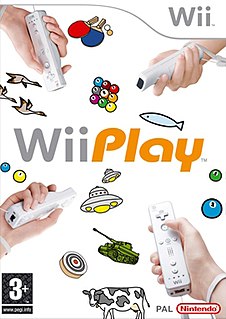 W
WWii Play is a party video game developed and published by Nintendo for the Wii console. It was released as a launch game for the console in Japan, Europe, and Australia, and was released in North America in February 2007. The game features nine minigames, including a Duck Hunt-esque shooting range, a fishing game, and a billiards game, each of which are designed to showcase the features of the Wii Remote controller.
 W
WWii Sports is a 2006 sports simulation video game developed and published by Nintendo for the Wii video game console. The game was released in North America along with the Wii on November 19, 2006, and was released in Japan, Australia, and Europe the following month. It was included as a pack-in game with the console in all territories except Japan, making it the first sports game included with the launch of a Nintendo system since Mario's Tennis for the Virtual Boy in 1995. Wii Sports is available on its own as part of the Nintendo Selects collection of games.
 W
WWii Sports Resort is a 2009 sports simulation video game developed and published by Nintendo for the Wii video game console, and is a sequel to Wii Sports. It is one of the first titles to require the Wii MotionPlus accessory, which was bundled with the game. Wii Sports Resort was first announced at E3 2008 and was released in Japan on June 25, 2009 and in nearly all other regions in the following month. While the game was originally released only as a stand-alone title, it was later bundled with newer Wii consoles alongside Wii Sports.